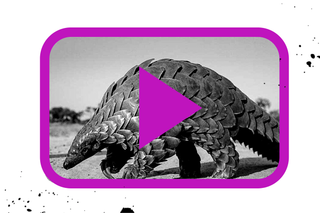
Indians Are Trading Pangolins Illegally on YouTube
The illegal trade enables animal abuse, threatens the ecosystem, and puts us at risk of zoonotic diseases.

YouTube channels with hundreds of subscribers are becoming breeding grounds for the illegal trade of pangolins, a type of mammal, in India, according to a new report by The Print.
Pangolins were previously linked to the initial outbreak of Covid19 in China — resulting in the Chinese government banning trade involving its scales and meat.
Yet, reportedly, 19 active YouTube channels have uploaded videos of the endangered species, or their parts, to attract buyers. “Barbaric videos show captured pangolins being teased, used as props for entertainment, and even slaughtered and skinned to record the process of separating scales from the body… the pangolin is in danger both in the real and virtual world,” conservationists Monesh Singh Tomar, Abhipsha Ghosh, and Kunal Sharma write in the article, adding that over 50 videos that were uploaded by the channels cumulatively have around 18 lakh views.
The trio noted in their report that the engagement on the videos has multiplied since 2018. In India, pangolins are protected under the Wildlife (Protection) Act, 1972, alongside tigers, lions, and rhinos. And yet, the illegal trade around the only mammal species wholly covered in scales has flourished.
Globally, too, the number of pangolin scales seized by law enforcement authorities tripled in volume between 2017 to 2019. Within India, “164 accused have been arrested from 12 states of the country,” the Deputy Conservator of Forests said in a statement to Free Press Journal last year, following a covert operation that led to the arrest of individuals trading pangolins on YouTube last June. They added that pangolins are emerging as a favorite among poachers, who hunt the species “because of their skin, scales, meat, and some of their body parts are used in making traditional medicine.”
Unfortunately, the rise in trafficking has also put the mammal on the verge of extinction. And that, in turn, threatens the ecosystem. “Pangolins are natural pest controllers of the forest, as they thrive on ants, termites, and larvae. They burrow into the ground and in the process, help improve the quality of soil,” Sasmita Lenka, a forest official in Odisha, who played a key role in busting an international network of pangolin smugglers in 2019, told The Better India.
Related on The Swaddle:
More Than 30,000 Indians Declare Exotic Animals as Pets in Response to Govt Query
In addition to disrupting ecological balance, wildlife trade also exposes humans to zoonotic diseases, that is, diseases transmitted from animals to humans. And what makes the pangolin-trade even more callous is that the mammal has already been linked to the ongoing global pandemic — that has killed millions of people worldwide since its onset in 2020.
But “even the fear of Covid was not enough to steer Asia’s illegal wildlife trade off [pangolins],” the conservationists wrote in The Print.
YouTube isn’t the only platform used by traders. A Mongabay report from April this year found that messaging applications like WhatsApp, besides social media sites like Facebook and Instagram, were also used to contact customers and discuss logistics of the trade.
While the sale-and-purchase primarily takes place online, poachers source pangolins offline — with the help of rural populations, who are often unaware of the illegality of the venture. “An agent or middleman approaches the tribal people in the area, and asks them if they know where pangolins could be found…,” Lenka said. “A few locals are usually aware of the pangolin’s whereabouts, but don’t know how endangered the species are. All the information is exchanged online. [They] usually pick up the animal for the agent in exchange for a few thousand rupees. When the animal is exchanged between agents across different states, the value increases to lakhs,” she added.
According to her, just four inches of a pangolin’s scale is priced at around Rs. 10,000 in the illegal market, and an adult pangolin can cost up to Rs. 10 lakhs — making the trade an extremely profitable venture, which probably explains the death threats she received while investigating the illegal operation.
Last month, the Wildlife Trust of India busted a similar racket in Meghalaya after baiting smugglers through a comment on one of their YouTube videos. Despite the arrests, the illegal trade appears to be going on undeterred. “…in today’s digital era of rapid networking, buyers and traffickers seem to be comfortably using social media platforms to connect with one another and fix deals… These comments laying out in the open reflected a complete disregard for the animal’s well-being, no fear of the law, and were bone-chilling,” the report by The Print states.
Devrupa Rakshit is an Associate Editor at The Swaddle. She is a lawyer by education, a poet by accident, a painter by shaukh, and autistic by birth. You can find her on Instagram @devruparakshit.
Related


Tell Me More: Talking Accountability and Transformative Justice with Deepika Bhardwaj
